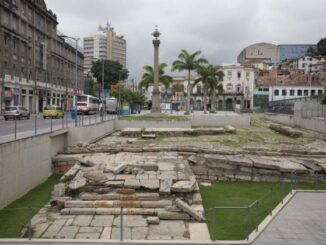Today, a “para inglês ver” (PIV) law, policy or project is one which, from the outside, appears to address a problem, but which in practice is merely a superficial change, a temporary fix or public relations exercise intended to appease community interests and appeal to domestic and international public opinion. It does little to benefit those it purports to help, either because implementation on a well-designed policy is poorly conducted and easily corruptible, or because it is actually designed for political motives rather than social or philanthropic ones. This situation occurs when public officials lack the genuine desire or political will to institute the necessary change, and is usually accompanied by an extensive PR campaign aimed at promoting the policy. To understand the history behind this expression, read http://bit.ly/1JWMh4H.

*Highlight
Two Centuries of Conning the ‘British’: The History of the Expression ‘É Para Inglês Ver,’ or ‘It’s for the English to See’ and Its Modern Offshoots
Clique aqui para Português In 1807, the Parliament of the United Kingdom passed an act abolishing the international traffic of enslaved people within the British Empire. Much of the pressure to pass the act had come […]

